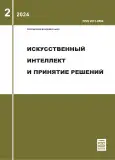Возможность применения методов искусственного интеллекта при прогнозировании исходов нейрохирургических операций
- Авторы: Забежайло М.И.1, Гаврюшин А.В.2
-
Учреждения:
- Федеральный исследовательский центр "Информатика и управление" РАН
- Национальный медицинский исследовательский центр нейрохирургии имени акад. Н. Н. Бурденко Минздрава России
- Выпуск: № 2 (2024)
- Страницы: 37-52
- Раздел: Системы, включающие искусственный интеллект
- URL: https://bakhtiniada.ru/2071-8594/article/view/265368
- DOI: https://doi.org/10.14357/20718594240203
- EDN: https://elibrary.ru/JXIDPS
- ID: 265368
Цитировать
Полный текст
Аннотация
Обсуждаются некоторые возможности применения методов искусственного интеллекта в задачах прогнозирования исходов нейрохирургических операций. В основе представляемого подхода – эвристика причинного сходства как средство восстановления причинно-следственных зависимостей, изначально скрытых в накапливаемых эмпирических данных. Математическая формализация этой эвристики строится с помощью уточнения сходства как бинарной алгебраической операции, используемой для сопоставления описаний прецедентов и поиска в них приближенных представлений о причинности целевых эффектов – исходов нейрохирургических операций. Возможности представляемого подхода иллюстрируются на результатах интеллектуального анализа реальных эмпирических данных, охватывающих серию нейрохирургических операций опухолей ствола, выполненных в 2005-2018 годах в НМИЦ НХ им. Н. Н. Бурденко.
Об авторах
Михаил Иванович Забежайло
Федеральный исследовательский центр "Информатика и управление" РАН
Автор, ответственный за переписку.
Email: m.zabezhailo@yandex.ru
доктор физико-математических наук, заведующий отделом
Россия, МоскваАндрей Владимирович Гаврюшин
Национальный медицинский исследовательский центр нейрохирургии имени акад. Н. Н. Бурденко Минздрава России
Email: avg.avg03@gmail.com
кандидат медицинских наук, врач-нейрохирург, научный сотрудник отделения глиальные опухоли
Россия, МоскваСписок литературы
- Pearl J. Causality: models, reasoning, and inference. N.-Y.: Cambridge University Press, 2000. P. 384.
- Höfler M. Causal inference based on counterfactuals. BMC Med Res Methodol, 2005. V. 5. No 28. https://bmcme- dresmethodol.biomedcentral.com/articles/10.1186/1471- 2288-5-28.
- Evidence-Based Medicine Working Group. Evidence-based medicine. A new approach to teaching the practice of medicine // JAMA. 1992. V. 268. No 17. P. 2420–2425.
- Howick J.H. The Philosophy of Evidence-based Medicine. Chichester (UK): J.Wiley & Sons, 2011. P. 244.
- Талантов П. 0,05 доказательная медицина от магии до поисков бессмертия. М: Corpus, 2019. C. 629.
- Pearson K. On Lines and Planes of Closest Fit to Systems of Points in Space // Philosophical Magazine. 1901. No 2 (11). P. 559–572.
- Shapley L.S. A value for n-person games. Santa Monica (CA): RAND Corporation. 1952. P. 15.
- Финн В.К. Индуктивные методы Д.С. Милля в системах искусственного интеллекта // Искусственный интеллект и принятие решений. Ч. I. 2010. № 3. С. 3-21. // Искусственный интеллект и принятие решений. Ч. II 2010. № 4. С. 14-40.
- Финн В.К. Интеллект, информационное общество, гуманитарное знание и образование. М.: ЛЕНАНД, 2021. С. 464.
- Кон П.М. Универсальная алгебра. М.: Мир, 1968. С. 359.
- Pigeonhole principle. Herstein I. N. Topics In Algebra. Waltham: Blaisdell Publishing Company, 1964. P. 342.
- Пирс Ч.С. Рассуждение и логика вещей. Лекции для Кембриджских конференций 1898 года. М.: РГГУ, 2005. C. 371.
- Забежайло М.И., Трунин Ю.Ю. К проблеме надёжности медицинского диагноза, формируемого на основе эмпирических данных // Искусственный интеллект и принятие решений. 2020. № 4. C. 3-13.
- Забежайло М.И. Устойчивость эмпирических зависимостей и проблема объяснения результатов интеллектуального анализа данных // Интегрированные модели и мягкие вычисления в искусственном интеллекте. Сборник научных трудов XI Международной научно-практической конференции (ИММВ-2022, Коломна, 2022 г.). В 2-х томах. Т 2. М.: РАИИ, 2022. C. 50–59. https://www.elibrary.ru/item.asp?id=48717390.
- Забежайло М.И. К проблеме использования методов и технологий искусственного интеллекта в современных цифровых системах управления // Научно-техническая информация. Серия 2. 2022. № 10. С. 15–22.
- Tarski A. The Semantic Conception of Truth and the Foun dations of Semantics // Philosophy and Phenomenological Research. 1944. V. 4. No 3. P. 341–375. https://sites.ual berta.ca/~francisp/Phil426/TarskiTruth1944.pdf
Дополнительные файлы








